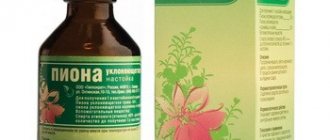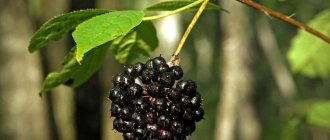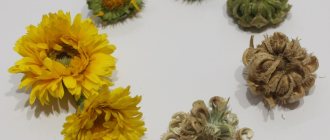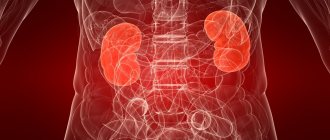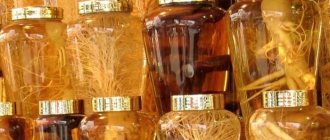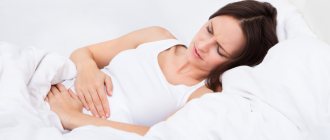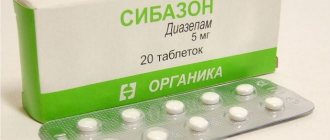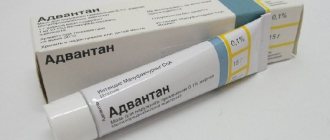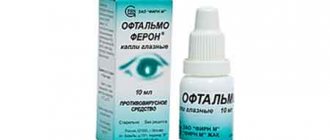Prohibited during pregnancy
Prohibited during breastfeeding
Has restrictions for children
Has restrictions for older people
Prohibited for liver problems
Prohibited for kidney problems
Peony is a sedative used in neurology. Peony-based tincture or tablets are also used in cardiology, as part of complex therapy for hypertensive crisis or arterial hypertension. No less common is the use of the drug in gastroenterology, hematology, gynecology, and endocrinology.
Preparations based on this substance are widely distributed throughout the world under various trade names and are relatively safe, as they are made from plant materials. But in addition to its benefits, like any other medicinal plant, evasive peony can cause harm if used incorrectly. Therefore, it is important to use drugs based on it only after consultation with a specialist.
Release form and composition
The herbal medicine is produced in the form of film-coated tablets: biconvex, round, from white with a yellow tint to white (10 pieces in contour cell packs, 3 packs in a cardboard pack).
1 tablet contains:
- active ingredient: peony evader dry extract – 150 mg (content of the sum of phenolic glycosides in terms of dry matter and salicin – 16%);
- additional components: low molecular weight medical polyvinylpyrrolidone (povidone), basic magnesium carbonate (magnesium hydroxycarbonate), milk sugar (lactose), calcium stearate, potato starch;
- shell: petroleum jelly (liquid paraffin), low-molecular medical polyvinylpyrrolidone (povidone), aerosil (colloidal silicon dioxide), basic magnesium carbonate (magnesium hydroxycarbonate), pigment titanium dioxide (titanium dioxide), beeswax, sugar (sucrose).
Indications and contraindications for use
Many people are interested in what medicine based on peony extract can help with. Let's consider cases when its use is appropriate and when one should refuse to take such medications.
Indications for the use of medicines containing extracts of peony roots or flowers are:
- lack of appetite;
- acne;
- neurasthenia;
- neuroses;
Symptoms of neurosis - insomnia;
- anxiety, restlessness;
- panic attacks;
- problems falling asleep;
- dermatitis;
- gastritis;
- intestinal diseases;
- ovarian cyst (auxiliary);
- oncology of the reproductive system (auxiliary or prophylactic agent);
- disruption of metabolic processes in the body;
- emotional instability;
- exposure to stress;
- decreased ability to work;
- apathy;
- PMS;
Manifestations of PMS - changes in blood pressure;
- muscle cramps;
- phobias;
- natural biorhythm disorders;
- immune suppression;
- climacteric disorders;
- hair loss, fragility, dullness;
- migraine of idiopathic etiology, etc.
As you can see, peony tincture and tablets are a universal remedy used to treat many diseases. But, despite this, there are situations when it is strictly not recommended to use the medicine.
Contraindications to taking peony include:
- allergy to the components of the drug or a tendency to allergic reactions of any other origin;
- childhood;
- period of gestation, breastfeeding;
- pathologies of the liver, kidneys;
- increased stomach acidity;
- arterial hypotension or a tendency to its occurrence.
Important! You should not take the medication in parallel with drugs that have the same properties without consulting your doctor. The combination of the drug in question with certain drugs can provoke the occurrence of undesirable reactions.
It is strictly forbidden for pregnant women to take the tincture, and this is not just because the medicine contains alcohol. The product has abortifacient properties because it stimulates uterine contractions and increases the tone of the reproductive organ. In the early stages this leads to involuntary miscarriage, in the later stages it leads to premature onset of labor.
Contraindications
Peony extract should not be used for:
- individual intolerance to the components of the drug;
- renal or liver failure;
- pregnancy, lactation;
- childhood (up to 12 years).
In the absence of contraindications, the drug is well tolerated, but sometimes patients still experience adverse reactions in the form of lethargy or drowsiness, and allergic manifestations. In case of an overdose, dizziness, nausea or vomiting, and stool upset are possible.
Detailed instructions for taking the medicine
Before starting treatment, you must study in detail the instructions for using peony tincture. The rules for taking alcohol extract and tablets are different, and this must be taken into account.
Alcohol tincture
How to take peony drops? The dosage of the medicine is an individual issue and depends on the purpose of the prescription and the severity of the current disease.
If an alcoholic extract of a medicinal plant is prescribed to a patient as a sedative, then first take 30 drops. If the expected effect is absent, the dose is increased to 40 drops. A further increase in the volume of tincture consumed can only be carried out on the recommendation of a doctor and under his careful supervision.
Before taking, a measured dose of medication is dissolved in half a glass of clean water. You need to drink liquid about half an hour before meals. The medication is used once a day.
The duration of the course of treatment is determined individually, based on the diagnosis and the intensity of the symptoms disturbing the patient. But in general, the duration of taking the tincture is a month. The course of therapy can be repeated after a short break.
Important! If after 2 weeks no positive dynamics were noted, there is no point in continuing treatment. In this case, it is necessary to choose a more effective medication.
For gynecological, dermatological and gastroenterological pathologies, for the treatment of which the doctor has developed a comprehensive treatment regimen, you need to start taking the tincture with 10 drops. Gradually, their number increases to 20, and then to 30. For skin diseases, the alcoholic extract of this plant is not only consumed orally, but also used externally - for compresses and lotions.
Pills
Peony extract in tablets is taken 150 mg (1 tablet) twice a day. Reception is carried out strictly before meals. The duration of therapy can range from 21 to 30 days. If necessary, you can re-treat with the tablet drug, but only after a 10-day break.
Patients' opinions
Most patients who have tried peony extract are satisfied with the results of the treatment:
- I drink the tincture periodically - at moments when PMS hits me headlong. Both my husband and children have already noted my adequacy in “these days,” and it has become easier for me;
- I didn’t like the effect - the action was too slow, and it made me feel excessively drowsy during the day. This is not what a sedative should be;
- The effect of the drug appears after 3-4 hours, but it is very calming. The only thing is that you shouldn’t get carried away, otherwise complete apathy will arise;
- After a serious illness of a loved one, panic and constant anxiety did not leave me for a long time. I took peony tablets in a course, and life began to sparkle with new colors.
Having decided to use peony extract, you should not rely only on reviews - even the most rosy description of the benefits of the drug does not guarantee a similar result in other people. Due to the toxicity of the plant, it is imperative to consult a doctor.
General information about the plant, its composition and beneficial properties
Peony evasive is a perennial herbaceous subshrub (or shrub) up to 1 meter high, with several trunks, a large powerful rhizome, at the ends of which there are cone-shaped seals, unpaired trifoliate or pinnately divided leaves of a dark green color. The flowers are single buds up to 20 cm in diameter, and the fruits are complex multi-leaflets, inside of which there are shiny, round or slightly oblong black-brown seeds.
This type of peony is found in Eastern and Western Siberia, regions of the Urals, northern parts of Kazakhstan, and less often in China or Mongolia.
All the beneficial components of the plant are concentrated in its leaves, stems and roots. The plant contains:
- flavonoids;
- glycosides;
- saponins;
- organic acids;
- Sahara;
- tannins;
- carbohydrates;
- resins;
- essential oils;
- microelements – manganese, iron, nickel, copper, chromium;
- aromatic compounds.
Important! Peony evasive is considered a poisonous plant, but in small doses it produces a high healing effect.
The rich chemical composition and wide range of effects allows peony to be used as a restorative, calming, tonic, anti-inflammatory, bactericidal, analgesic, detoxifying, and appetite-improving agent.
Side effects and overdose
It is important to remember that peony is a poisonous plant, so the body may react sharply to medications containing its extract. Typically side effects occur:
- hives;
- hyperemia and swelling of the epidermis;
- itchy skin rash;
- drowsiness;
- decreased concentration.
Hives
In addition, irritation of the intestinal mucosa is possible, which will lead to nausea, stomach pain, and vomiting.
It is very important to follow the dosage of peony-based medications. Exceeding it can lead to severe drowsiness, impaired cognitive function, nausea, vomiting, and intense gastralgia.
An overdose also provokes a sharp increase in gastric acidity. It is characterized by the appearance of belching with an unpleasant odor, causeless hiccups, and severe heartburn.
Less common is a decrease in blood pressure. If necessary, symptomatic therapy is carried out aimed at eliminating the ailments that have arisen.
The use of peony during menopause
Tincture or tablets with peony are widely used during menopause. There are several reasons for this.
- The medicinal plant has a beneficial effect on hormonal levels. Since during menopause women experience a gradual decrease in hormone levels and a decline in reproductive function, they experience unpleasant symptoms such as increased sweating and hot flashes.
MenopauseTaking a peony-based tincture or a tablet form of the drug helps normalize hormonal levels, which leads to the elimination or significant reduction in the intensity of unpleasant symptoms.
- During menopause, many women complain of sleep disorders. They are tormented by insomnia, or have an anxious, sensitive night's sleep, often accompanied by nightmares. All these anomalies are associated with changes occurring not only in the hormonal background, but also in the functioning of the nervous system. Peony-based drops are a good, potent sedative and hypnotic. Thanks to their intake, sleep and the process of falling asleep are gradually normalized.
- Peony eliminates mood swings and makes the female body more resistant to stress. And this is very important for women who have entered the menopausal phase, because emotional lability becomes their constant companion.
Of course, this medicine will not be able to restore menstruation or restore reproductive function. But this does not reduce its effectiveness in combating the unpleasant symptoms of menopause.
Drug interactions, analogues and substitutes
Tincture or tablets should not be combined with drugs that have a tonic effect. The same applies to some medicinal herbs. For example, ginseng.
Peony enhances the effects of other sedative and hypnotic medications. It also increases the effectiveness of antispasmodic medications. It can be combined with antihypertensive drugs of plant origin - motherwort, hawthorn.
There are no analogues, even combined ones, that contain peony as one of the active ingredients. But if necessary, the medicine in question can be replaced with drugs similar in therapeutic effect:
Alluna. A combined sedative and hypnotic medication consisting of valerian root extract and hop cones. Dispensed in the form of tablets for oral administration. Indicated for sleep disorders, neuroses, neurasthenia. You should not take tablets if you are depressed, hypersensitive to their components, pregnant, or breastfeeding.- Pasimona – syrup for oral administration. Contains liquid extract of passionflower herb. Belongs to the group of sleeping pills and sedatives. Prescribed for neuroses, insomnia, neurasthenia, problems falling asleep. The medicine is contraindicated in depression and other conditions accompanied by central nervous system depression. In addition, the medication is not prescribed to children under 3 years of age. The syrup is prescribed with caution to pregnant women and nursing mothers.
- Antistress Labopharm. A combined tablet preparation consisting of dry extracts of valerian rhizomes, hop cone powder, lemon balm leaf powder, etc. The drug helps well with sleep problems, nightmares, frequent awakenings, and disruptions of natural biorhythms.
The medication has a calming effect on the body of women during PMS and menopause. Children over 6 years of age are prescribed to facilitate the process of falling asleep. Patients with individual intolerance to their components, arterial hypotension, depression, and bradycardia should not take tablets.
There are a lot of peony substitutes, many medicines have a complex composition. But if the patient prefers to carry out therapy with single-component drugs, then this tincture can be replaced with motherwort or valerian.
